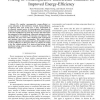Free Online Productivity Tools
i2Speak
i2Symbol
i2OCR
iTex2Img
iWeb2Print
iWeb2Shot
i2Type
iPdf2Split
iPdf2Merge
i2Bopomofo
i2Arabic
i2Style
i2Image
i2PDF
iLatex2Rtf
Sci2ools
EJWCN
2010
2010
Pricing in Noncooperative Interference Channels for Improved Energy Efficiency
Abstract--We consider noncooperative energy-efficient resource allocation in the interference channel. Energy-efficiency is achieved when each system pays a price proportional to its allocated transmit power. In noncooperative game-theoretic notation, the power allocation chosen by the systems corresponds to the Nash equilibrium. We study the existence and characterize the uniqueness of this equilibrium. Afterwards, pricing to achieve energy-efficiency is examined. We introduce an arbitrator who determines the prices that satisfy minimum QoS requirements and minimize total power consumption. This energy-efficient assignment problem is formulated and solved. Simulation results on energy-efficiency are then given where we compare our setting to the one without pricing. It is observed that pricing in this distributed setting achieves higher energy-efficiency in different interference regimes.
EJWCN 2010 | Energy-efficient Assignment Problem | Noncooperative Energy-efficient Resource | Noncooperative Game-theoretic Notation |
| Added | 17 May 2011 |
| Updated | 17 May 2011 |
| Type | Journal |
| Year | 2010 |
| Where | EJWCN |
| Authors | Zhijiat Chong, Rami Mochaourab, Eduard A. Jorswieck |
Comments (0)

